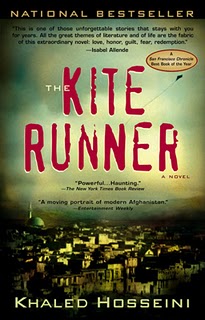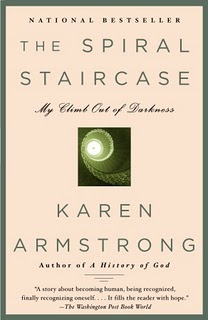Jumping Into My Bookbag of Tricks
I recently finished three books that completely knocked my socks off, all for the same reason: they are superbly written stories that unveil the beauty and fragility of the human heart. Although one's fiction, one's spiritual autobiography, and one's a social work memoir, these books transcend genres by demonstrating that a well-told story that dignifies the spirit in us and others has the power to not only captivate but also help us better embody our own humanity.
The Kite Runner by Khaled Hosseini

The Kite Runner is the story of two boys, Amir and Hassan, who grow up in Afghanistan. Although they come from two very different social classes -- Amir's father is wealthy, and Hassan's father is a servant in Amir's home -- the two boys are best friends. However, where Hassan is as innocent as a dove, Amir is watchful and possessive, particularly of his father's affection, which does not flow down to him freely. And on one particular afternoon, when Amir has an opportunity to rescue Hassan from one of the most vulnerable circumstances a young boy could possibly endure, Amir chooses to run away and leave his small friend alone.
It is a decision that haunts Amir the rest of his life. And when we meet him in adulthood, he is presented with an opportunity to atone for his sin. The only question is, does he yet have what it takes to take a stand, to be loyal, to exert himself beyond his own pain, even if it will ultimately cost him his life?
I don't know how to communicate with enough force the importance of this book. Not only is it a masterpiece in the art of storytelling, with layers upon layers folding and unfolding upon themselves with such skill and dexterity that it makes you gawk in amazement, but it tears your heart open at what we as humans have the power to do to one another, and how utterly vulnerable are the innocents. Hassan's innocence and loyalty and trust, in particular, captivated my heart and made me love him deeply; I felt the same tender affection and protectiveness toward his son, Sohrab, later in the book. But there were other times I wanted to throw the book as far across the room as possible, either because of Amir's despicable actions (or inactions) or because of the positive ugliness of human evil. This story maintains a constant tension between the delicate and the forceful, the beautiful and the ugly, the redemptive and the damned, with a final culmination that builds with greater and greater intention into events positively heartbreaking and full.
I'm kicking myself for having waited so long to read this book, because it is one of the finest novels I have ever read in my life. I mean that sincerely. It will get inside your soul and eat you up. It will make your heart explode. It will make you weep again and again and again. It will spend you. I do hope you decide to read this book someday, if you haven't already. And I would love to hear your thoughts on it when you do.
The Spiral Staircase by Karen Armstrong

As I shared in a previous post, Karen Armstrong's The Spiral Staircase: My Climb Out of Darkness is a book that found me, quite unexpectedly, in a Borders bookstore. In my original post, I shared that I thought this book might be important for me at this time in my life, and I believe I now know why.
Armstrong's story is many things. It is the story of someone who wanted to find God so badly that she went searching for him inside convent walls, only to learn that God was not found in strictures and the flagellation of the self. It is the story of someone learning how to live outside convent walls and outside the life of faith. It is the story of someone who thinks academia can save her, only to find herself eventually cast outside its walls, too.
It is the story of someone searching for a life. It is the story of someone finding a life. It is the story of someone struggling for many years through a misdiagnosed illness, and it is the story of someone eventually moving back toward the idea of God, though from quite an unconventional vantage point.
I really resonated with many of these searches of Armstrong's life, but what struck me most forcibly about this book is that it is also the story of the tenderness of the human heart and why it must be treated with care above all else -- why it must be given room to breathe and have full life or it will die. Much of Armstrong's painful experience of the Catholic convent concerned the rigidity, the rules, the fastidiousness, and the uncompromising obedience she was forced to give in questionable circumstances without being given the privilege of a question. She makes repeated pleas for love, for affection, for understanding, and for God, only to receive in return closed doors, closed lips, and closed hearts. She is dismissed as dramatic and dangerous. She is left completely alone.
My own heart broke for Armstrong many times as I saw the many instances where the opportunity for true life was there, right within reach, and could have been had through the simple attempt of another human being to understand and receive and love her, right where she was, and yet how each human being chose instead to turn away. There seemed to be a treacherous fear of reality behind the eyes of each of those people.
I read this book while staying at a monastery in Santa Barbara, California. It was a quiet space to contemplate these themes concerning the human heart, honesty, and understanding. As I read, I felt a tremendous roar welling up inside of me to protect and defend the hearts of other human beings, to allow them room to speak their truth, no matter how scary they have feared that truth may be, even if such truth has been hidden for years behind masks and rage. It is my conviction that the love of Christ is found in such unguarded moments and in such merciful places. I guess you could say that my compassion for Armstrong and my rage at what harm she received from so many different outlets was simply a confirmation of my own calling.
This book was also a teacher for me. Many times I watched Armstrong reach a crossroads in her life, either through circumstance or relationship, and then watched her look introspectively inside herself to decide who she was going to be, separate from anyone else's dictation. Sometimes, when accused of wrongdoing or exaggeration, she went deeper inside herself to consider ways she may have been wrong, or what part was hers to own in some mishap. I really respected these qualities in her, the willingness to carve her own path and the openness to consider her own fallacy, especially in a time when I am learning to speak my own truth and to own my own life. This book, probably without the author's intention, taught me much about personal boundaries.
And finally, this book challenged me. When I spoke of it in my previous post, many of you indicated an interest in learning where Armstrong lands spiritually by the end of the book. The book is very much an excavation of her own appraisal of that question through an approximately 30-year journey. After leaving the convent, she stands on the fringes of Catholicism, simply because it is all she knows. Then she brazenly rejects it for a very long season. Religion becomes an intellectual pursuit only, and she finds much to criticize in the Christian faith. But slowly, slowly, she begins to contemplate God and His real presence again.
For those looking for a final-page conversion story back to Christianity, I'm sorry to say you will not find that here. Armstrong embraces the Abrahamic faiths -- Christianity, Judaism, and Islam -- as equals and more symbolic than true. What you will find, however, is something somewhat remarkable in its own right. Because Armstrong met with so much personal injustice in her own life, saw the effects of hard-heartedness and an unwillingness to listen and receive vulnerable pilgrims in their quests for love and understanding through the unfolding of her own story, the momentum of this theme builds through the book until it makes perfect sense that she ultimately embraces something which she calls the science of compassion: a so-high regard for the dignity of other human beings that it asks for our sincere attempt to get inside their skin, to see the world from their eyes so that we can truly understand and receive them where they are.
I found this idea marvelous on one hand, because I think it is the true spirit of Christ. It also mirrors much of my own conviction about the need for compassion and the dignity of the human heart. However, it also lands Armstrong eventually at her own conviction that no human being can proclaim to have knowledge of any supreme truth of one religion above another, which challenges me because I subscribe to the Christian faith as a true representation of reality. Her movement from compassion to this rejection of any overarching religious truth forced me to consider how my own zeal for compassionate love does not land me where she does. This is a complicated question I have not fully wrestled to the ground. Even so, hers is a superbly told story that is very real and worth reading, and which ends with some strong roots shooting down into true and beautiful places, even if not fully mirroring my own perspective on reality.
One Small Boat by Kathy Harrison

I picked up One Small Boat quite by accident two weeks ago when browsing the bargain racks at Borders. I was drawn to the cover (isn't it cute?) and then to the title and subtitle: One Small Boat: The Story of a Little Girl, Lost Then Found. Wow. Compelling.
It didn't take much more to hook me. The jacket copy described a five-year-old girl named Daisy who showed up on the author's doorstep in need of care. Harrison, who with her husband is a long-time foster care parent, has seen almost everything in her twenty-year tenure, yet Daisy's case is unique. She barely eats. She doesn't speak. She flaps and spins. And what's more, her family doesn't fit the usual demographic.
Yet what happens under Harrison's roof in the name of Daisy's healing is nothing short of miraculous. Here, she learns to eat real food. Here, she begins to smile. Here, she starts to communicate. Here, she begins to shine.
I am not a parent, nor do Kirk and I have plans to ever be. So why was I so taken with this book? Why did I carry it with me everywhere I went in this past week? I finally realized that it came down to this: the sheer vulnerability of a life, how it can be broken in such young places, and how healing is found in love, in safety, in trust, in strength, in softness, in grace, in the arms of a human touch. This book will break your heart and make you laugh. It will amaze you and astound you. It will make you shake your head and it will make you yell out loud. You will wish to God the story wasn't true. But you will also give great thanks that it is.